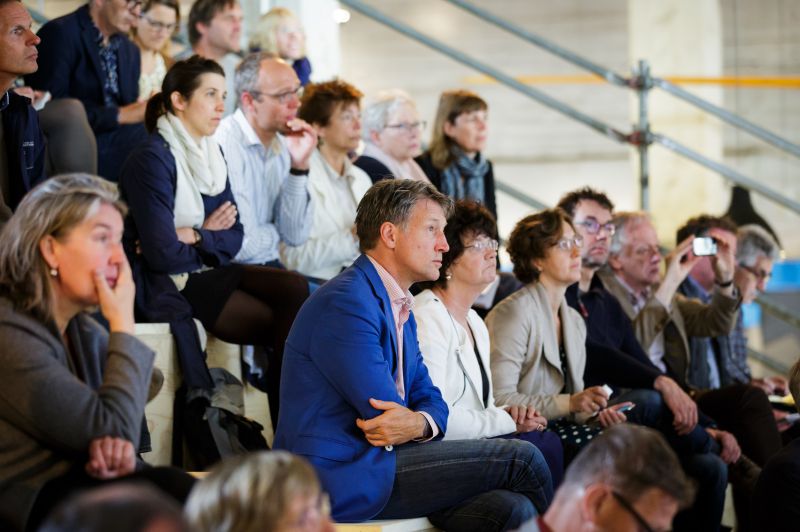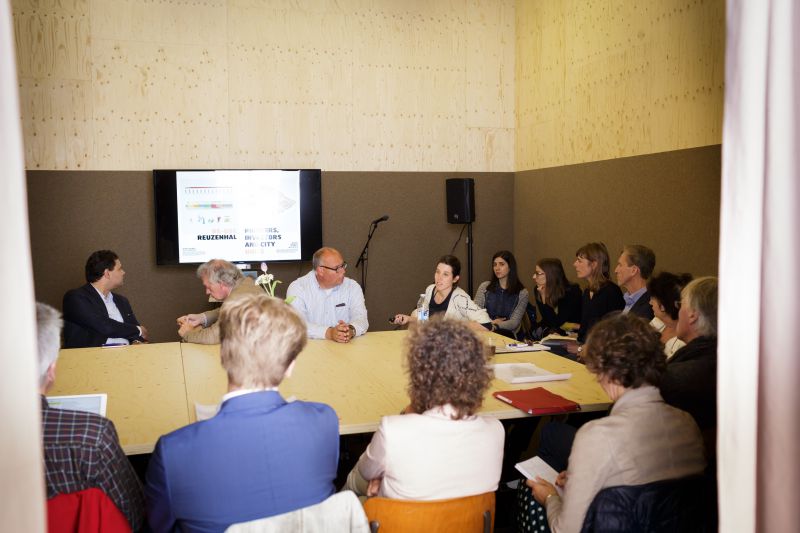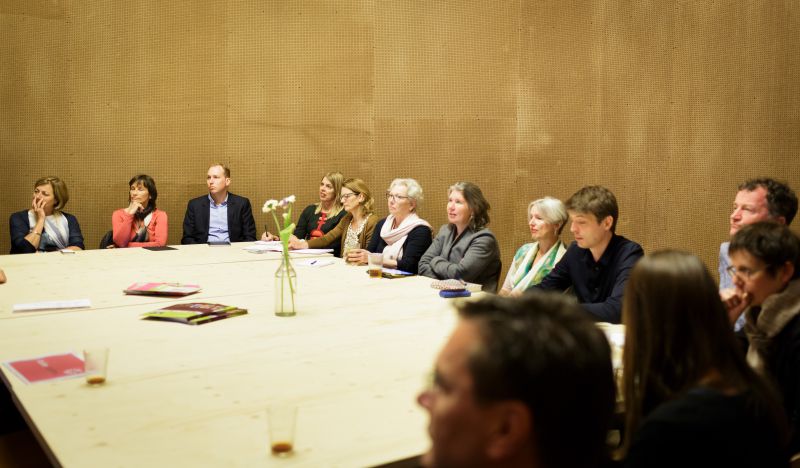
Photo: Fred Ernst
On May 18th the Municipality of Utrecht and the IABR organized the conference “Utrecht: Transitions in the Healthy City” as part of the What’sNext program of the IABR–2016. Starting point were the outcomes of IABR–Atelier Utrecht: the Healthy City and the question how the municipality should continue with the results. The platform of the biennale was used to bring different parties together around the conclusions of the Atelier. The meeting was an important stepping stone within an ongoing trajectory: the Municipality of Utrecht will continue working with the results. The first next step is the exhibition of the results of Atelier Utrecht in the City Hall and a program of activities developed together with AORTA Center of Architecture Utrecht.
Plenary session
In the morning atelier master Joachim Declerck presented the main findings of the research by design of Atelier Utrecht. He stressed the importance of looking at health from the perspective of positive health as developed by Machteld Huber (Institute for Positive Health): ‘The ability to adapt and to self-manage, in the face of life’s social, physical and emotional challenges.' The most promising opportunities to develop Utrecht as healthy city can be found in making use of the transitions in the health care sector by forming new coalitions around a shared social agenda, in intensifying the cooperation with the existing health care centers in the city and region, and in the integration of social programs in urban development plans. The Municipality can only harvest these opportunities if it manages to strengthen the interaction between different policy sectors, embed them in the spatial domain and connect the many (local) stakeholders who work on to the healthy city Utrecht. This requires a pro-active government: the government as choreographer.
After the plenary session there were two workshops, focussing on further elaborating the results of Atelier Utrecht.
Workshop: Socially Responsible Investment Strategies for the Healthy City
The workshop Socially Responsible Investment Strategies for the Healthy City focused on the importance of creating social meeting spaces in the neighborhood Overvecht. The argument is that instead of of demolishing empty school buildings, the buildings could be used for local initiatives that contribute to social inclusivity in the neighborhood. The need for meeting spaces on the neighborhood level was also one of the conclusions of a research done by the district office Overvecht into job opportunities, health, safety and communities.

Photo: Fred Ernst
The participants of the workshop underlined the importance of meeting spaces and stressed the importance of activating these meeting spaces by developing program in close collaboration with stakeholders from the neighborhood. Inhabitants and local stakeholders can be challenged to collectively think about a program to make these places profitable. An additional challenge is to connect socially responsible investors to the process of financing these types of local and small scale spaces and initiatives. The Municipality of Utrecht will further develop the proposal made by Atelier Utrecht on how to use the empty schools buildings in the neighborhood Overvecht for neighborhood program and local initiatives.
Workshop: Care in the Next Economy
The workshop Care in the Next Economy was centered around the changes in the health care sector and the subsequent changing offer of care services. Many of these new care services already work with the concept of ‘positive health’: people are stimulated to self-manage and new types of care are explored which not only focus on the individual, but also strengthen his/her (local) network. Wheteher these services will be able to further develop depends on new financing models and the rethinking of existing structures. The examples in Utrecht of Axion Continu and Saltro and the Bartholomeus Hospital provide a rich base to further explore new financial models for the proposals made by Atelier Utrecht.

Photo: Fred Ernst
Local follow up of IABR–Atelier Utrecht
The Municipality of Utrecht will further develop the outcomes of Atelier Utrecht locally. To stimulate the local debate the results of Atelier Utrecht are exhibited in the City Hall of Utrecht from 25 July until 7 October 2016. Together with AORTA Center of Architecture Utrecht a program of activities is developed. For more information pleas click here.
Atelier Utrecht is a collaboration of the IABR and the Municipality of Utrecht.
The atelier master is Joachim Declerck (Architecture Workroom Brussels).
The Belgian offices Achitecture Workroom Brussels and De Smet Vermeulen architects, and MUST urbanism from Holland have been commissioned to do the design research and to develop pilot projects. AORTA Center of Architecture is an active partner.
The IABR initiates and produces the Project Ateliers as a lead partner for the Regional and Local Design Dialogue Program, within the framework of the Ministry of Infrastructure and the Environment’s Action Agenda for Architecture and Spatial Design 2013–2016.